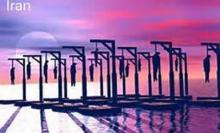Halt the execution of Ahwazi-Arab political prisoners
The four men, Abdulreza Amir Khanafereh (26), Ghazi Abbasi (31), Abdulamir Mojdami (33) and Jasem Moghadampanah (28) - were sentenced to death by Judge Ali Farhadvand at Branch 1 of the Ahwaz Revolutionary Court last year. Three others were given life sentences. These sentences were upheld by Judge Reza Farajollahi at the Supreme Revolutionary Court on 13 February 2013.
The four men had been transferred to an unknown location into the custody of the Ministry of Intelligence on 3 November, from Karoun prison, in the Arab majority south-western province of Khuzestan, or as it called by its indigenous Arab inhabitants Al-Ahwaz.
The four men had been sentenced to death on 15 August 2012 by Branch One of the Revolutionary Court of Ahwaz for the vaguely worded charges of “enmity against God” (moharebeh) and “corruption on earth" (ifsad fil-arz), Amnesty International reported.
Iran Roundtable has also learned that two other Ahwazi-Arab activists are also under imminent execution. Imprisoned teachers Hadi Rashedi and Hashem Sha’bani have been transferred to an unknown location, which suggests their executions may be imminent.
Hadi Rashedi and Hashem Sha’bani Amouri were arrested in early September 2011, along with three other men, Mohammad Ali Amouri, Sayed Jaber Alboshoka and his brother Sayed Mokhtar Alboshoka, apparently in connection with their cultural activities on behalf of Iran’s Ahwazi Arab, Amnesty International reported.
While strongly condemning the recent execution of four Ahwazi Arabs, Iran Roundtable is deeply concerned about the fate of these five political prisoners and calls upon the Iranian authorities to halt the execution of political prisoners especially the five Arab activists under imminent execution. Iran Roundtable also calls for the retrial of all imprisoned activists in proceedings in line with international fair trial standards and without recourse to the death penalty.
Rights groups have documented more than 400 executions in Iran so far in 2013, with at least 125 of those carried out since the election of the so-called moderate President Hassan Rouhani on June 14.
On October 26, 2013, the government executed 16 people in what the prosecutor said was “retaliation” for the killings of more than a dozen border guards along the Iran-Pakistan border. Authorities also executed three Kurdish prisoners without warning on the same day sentenced to death for their alleged links to Kurdish armed opposition groups.
Iran Roundtable is deeply concerned about the deteriorating human rights conditions under the regime of Islamic Republic of Iran in general, and its unabated continuation in areas belonging to nationalities Arabs, Baluchis, Kurds and Azeri Turks in particular.
Iran Roundtable has welcomed in the past, stronger international measures on the Iranian regime to adhere to its commitments under international laws in regards to human rights.
Iran Roundtable requests that the Iranian Government allows Dr. Ahmad Shaheed, UN Special Rapporteur for human rights in Iran to travel to Iran and visit with political prisoners and their families.
Failing to further do so, the international community must be prepared to exert further pressure on the regime in Iran through available mechanism, such as the United Nations General Assembly and UN Human Rights Council among others.
Iran Roundtable also joins other international calls to warn against the sacrifice of human rights at the altar of a political deal over the regime’s unnecessary and costly nuclear dossier.

